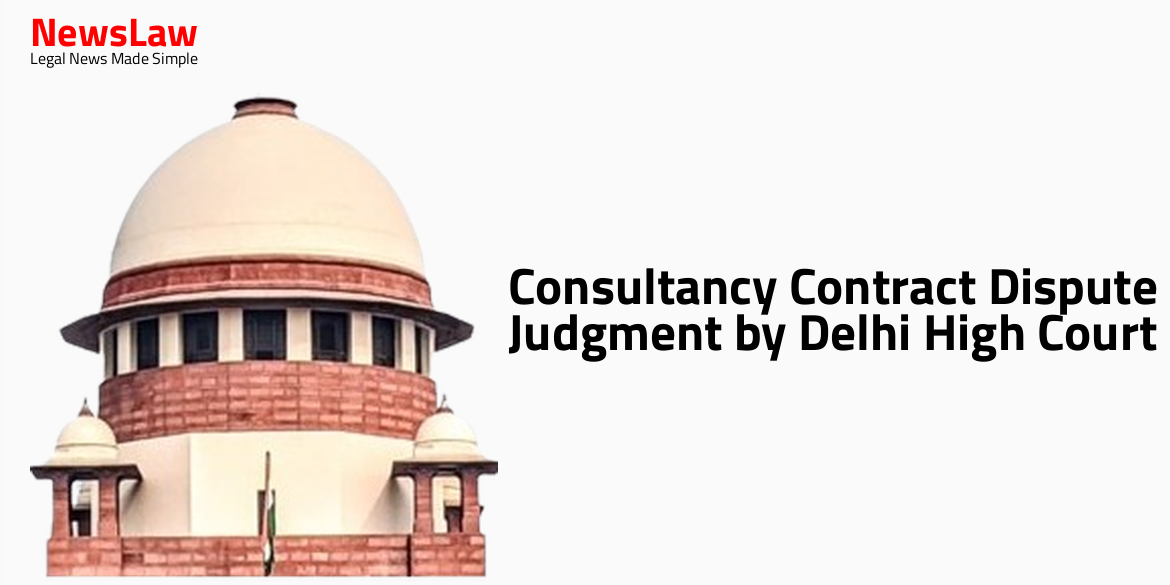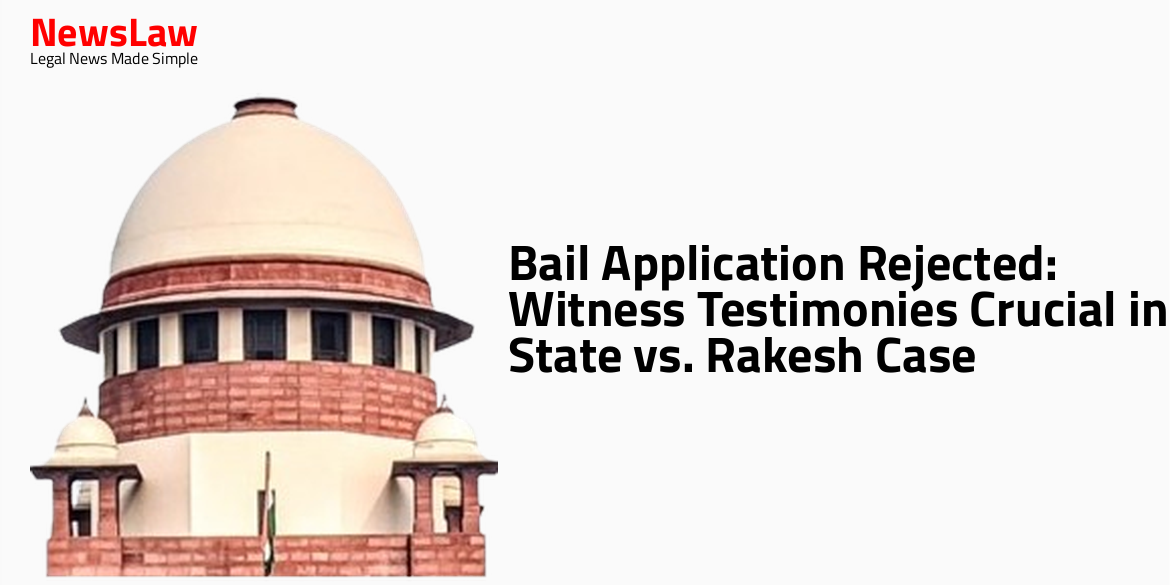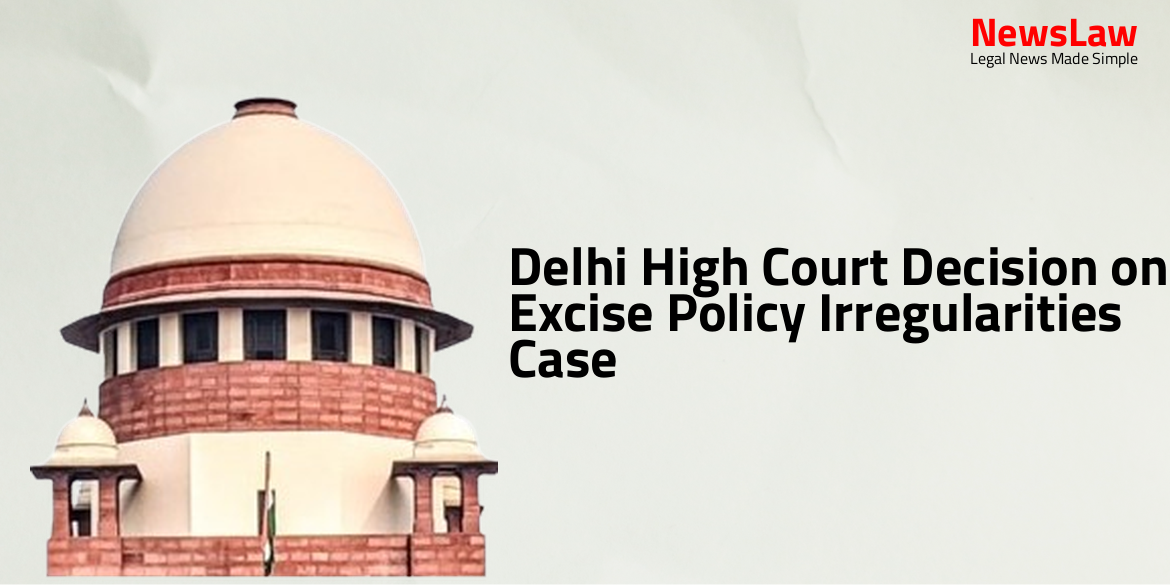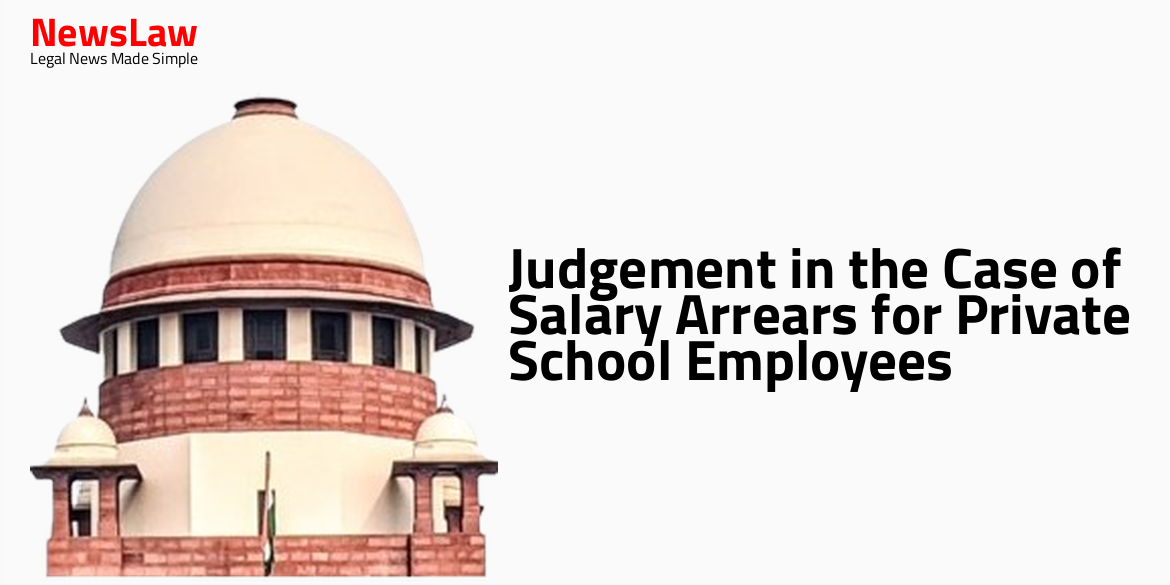Delve into the recent judgment by the Delhi High Court regarding a consultancy contract dispute. The court’s decision sheds light on the complexities surrounding the claims made by the parties involved in the case. Explore the findings and implications of this crucial legal battle.
Facts
- Contracts were for consultancy services in connection with construction projects.
- Disputes referred to arbitration under three contracts due to disagreement on claims.
- Petitioner’s claims based on enhanced project cost awarded to contractor.
- Claims rejected by learned Arbitrator.
- Parties’ contentions and nature of contracts similar.
- Interest claimed on various amounts.
- Miscellaneous claims made only in Vizag case.
- Definition of ‘Project Cost’ revised in contract.
- Differences in claims between Vizag, Pune, and Ahmednagar cases.
- Consultancy charges linked to project cost.
- Details of specific claims made by the petitioner in Vizag, Pune, and Ahmednagar cases.
- Scope of work for the consultant in the contracts.
- Payment structure for consultancy charges.
- Lowest bids by petitioner for consultancy contracts.
- Three contracts entered into on 22.05.2009.
- Contracts for projects in Vizag, Pune, and Ahmednagar.
- Estimated project costs and completion times for each case mentioned.
- Purpose of petitions under Section 34 of the Arbitration and Conciliation Act, 1996.
- Common analysis for claims arising from project cost enhancement and prolongation of contract.
Arguments
- The petitioner raised claims for increased costs during the execution phase of the contract which it managed and supervised.
- The consultancy charges were to be computed based on the enhanced project cost as per Clause 1.10 of the Contract.
- The learned Arbitrator assessed evidence to determine if the petitioner had incurred the claimed expenditures for reimbursement.
- The claims were supported in the statement of claim and affidavit of evidence filed by the petitioner’s witness.
- Claims related to the enhancement of consultancy fee were based on Clause 22(q)(iv) of the Contract.
- Mr. Jayant Mehta argued that the claims incorrectly characterized as arising from prolongation of the Contract.
- The petitioner incurred additional costs for providing consultancy services beyond the original scope at the three project sites.
- The Arbitrator found against the petitioner on claims for defect liability period services and rejected them due to lack of evidence.
- The Arbitrator’s interpretation of certain clauses led to the rejection of claims for prolongation compensation.
- Article 16 of the Contract was cited by Mr. Mehta to argue for fair and good faith actions between parties.
- The respondent’s reliance on certain judgments was supported by Mr. Garg and Mr. Singh in defense of the Arbitrator’s findings.
- Evidence was deemed essential for cost reimbursement claims according to judgments cited by Mr. Garg and Mr. Singh.
- Mr. Mehta argued for evidence-based reimbursement of costs incurred by the petitioner during project delays.
- The Arbitrator’s rejection of claims based on certain clauses was challenged by Mr. Mehta and deemed misplaced.
- The distinction between claims for enhancement of project cost and claims related to prolongation of the Contract was highlighted as crucial.
- The Arbitrator’s misconceptions regarding certain claims were pointed out, indicating a need for clarification and decision.
- The petitioner’s claim for a percentage of the contracts awarded to the contractor was based on specific contract clauses.
- The petitioner’s grievance against the respondent is solely related to the delay in terminating the contractor’s engagement.
- The progress of construction work by the contractors was considered dismal with periods of stalled work.
- The arbitrator noted that the petitioner, an experienced consultant, accepted a fixed fee despite being aware of potential project delays.
- The petitioner’s recommendation for time extension to the contractor was questioned.
- The arbitrator found the petitioner unable to justify claims of proper supervision as required by the contract.
- The petitioner’s claims were primarily based on CPI index rise in remuneration packages without adequate documentary support.
- The arbitrator also rejected two specific claims due to lack of evidence and justification.
- The delay in project completion was attributed to the contractor, not the respondent.
- There were claims made for services provided beyond the Defect Liability Period, increased due to CPI index rise in salaries.
- The specific claims regarding salary expenses for staff were not fully adjudicated in the award.
Analysis
- The onus of proving the quantum of damages was upon the petitioner.
- The petitioner chose not to lead any evidence other than the CPI.
- The claimant did not place and prove on record bills from which the amounts were allegedly deducted.
- A party in possession of the best evidence is required to produce it in court; failure to do so may result in adverse inferences.
- The CPI index alone was deemed insufficient to award the claim for prolongation of the contract.
- The prolongation claims were rejected due to lack of sufficient evidence.
- No evidence was led by the claimant to prove the claim for variation in Service Tax.
- The claimant’s reliance on self-serving calculation sheets was found to be insufficient.
- The court deferred to the interpretation of contractual terms by the Arbitrator.
- The claimant failed to meet the high standard of proof required for their claims.
- The Arbitrator’s findings on sufficiency of evidence were considered reasonable.
- Presumption of adverse inference for non-production of evidence is optional and requires consideration of case-specific facts.
- Responsibilities of the consultant team during construction were outlined.
- The contractual terms regarding project completion schedules were upheld.
- Adverse inferences may be drawn if one party requests the production of documents and they are not provided.
- Specific staff requirements during the project phases were discussed.
- The claim for reimbursement of expenses lacked evidence or proof of payments.
- The impugned awards in the Vizag case were set aside for rejecting specific claims without sufficient evidence.
- The Arbitrator’s assessment leading to the rejection of certain claims was considered reasonable.
- Detailed analysis of contractual provisions and evidence led to rejection of claims based on delay attribution.
- Responsibility of the consultant team outlined for cancellation of contracts with contractors.
- Consultant, Project Manager, and contractor to conduct joint inventory in case of contract cancellation.
- Recognition that Contract may not cover all contingencies and agreement to operate fairly.
- Parties to negotiate and resolve any perceived unfairness in Contract operation.
- Failure to agree on resolution may lead to dispute subject to arbitration.
- The National Highways Authority of India (NHAI) had filed an appeal against the judgment of the Division Bench of the High Court which upheld the award passed in favor of the respondent (Hindustan Construction Company Ltd).
- The Supreme Court noted that the respondent had successfully completed the work under the contract and was entitled to the compensation awarded.
- The NHAI’s contention that the respondent had failed to provide Bank Guarantee as per the contract was dismissed by the Court.
- It was held that the respondent had substantially complied with the requirements of the contract.
- The Supreme Court upheld the award passed in favor of the respondent and dismissed the appeal filed by NHAI.
- The Court directed NHAI to release the amount awarded to the respondent along with interest.
- The exercise of determining claims fell within the domain of the learned Arbitrator
- Arbitrator examined invoices to verify unjustified deductions and GST claims by the petitioner
- Petitioner did not provide necessary bills to support their claims
- Arbitrator found the contractual clauses to be ambiguous and required construction
- Arbitrator was justified in accepting claims without evidence from the respondent
- Suggested interpretation could be derived from Article 16 for guidance
- Judgment relied on Union of India v. Ibrahim Uddin to summarize the law on adverse inference.
- Preferred the judgment in Asian Techs over Ramnath International Construction (P) Ltd. v. Union of India.
- In Simplex Concrete, upheld an award of damages on the ground that contractual clauses preventing damages for contract delay were void per Section 23 of the Indian Contract Act, 1872.
- In NHPC, differentiated between claims for damages needing quantification and claims for reimbursement requiring evidence.
- In Salwan Construction, emphasized that non-speaking awards must be based on evidence, not mathematical derivations or novel formulas.
Decision
- The petition is rejected with regard to all claims except Claim Nos. 1, 2, and 3 in the Pune and Ahmednagar cases.
- O.M.P.(COMM) 526/2023 and O.M.P.(COMM) 527/2023 are dismissed.
- Costs are to be based on the rates quoted in the financial proposal with nothing extra payable to the consultant.
- All pending applications are disposed of, and the impugned award is set aside in relation to the rejection of Claim Nos. 1, 2, and 3.
- The petitioner is allowed to institute fresh arbitration proceedings for the said claims.
- Claim Nos. 4 and 7 in the Vizag case, and Claim No. 4 in the Pune and Ahmednagar cases are addressed with regard to the prolongation of the contract.
- The consultant is to prepare tender documents based on specific details, submit copies of complete tender documents, evaluate tenders, and submit recommendations.
- The petitioner is given the freedom to initiate fresh arbitration proceedings for the mentioned claims.
Case Title: WADIA TECHNO ENGINEERING SERVICES LIMITED Vs. DIRECTOR GENERAL OF MARRIED ACCOMMODATION PROJECT & ANR. (2024:DHC:4336)
Case Number: O.M.P. (COMM)-518/2023



